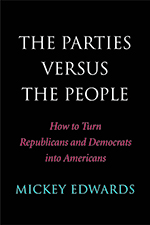In Mickey Edward’s new book, The Parties Versus the People: How to Turn Republicans and Democrats into Americans, he discusses how Americans’ recently-acquired inability to compromise has weakened the federal government. In this excerpt from Chapter Twelve of the book, titled “Beyond Partisanship,” he attributes the lack of compromise in part to “myside bias.”

Mickey Edward's new book is The Parties Versus the People: How to Turn Republicans and Democrats into Americans
It has long been assumed that the conflicts within the House and Senate are so seemingly unbridgeable because they rest on the embrace of divergent values. But if Representative A and Representative B simply disagree on the “right” course of action — the one responsive to the highest values — compromise is still possible because there are often ways to accommodate those differences. If, for example, A places the highest premium on the protection of individual choice (the “liberty” imperative) and B values collective responsibility (the “social” obligation), solutions can be found that address communal problems using incentives rather than coercion, and creating minimal interference with freedom of choice. Another, less attractive, assumption has been at play as well. Liberals and Democrats sometimes tend to believe that conservatives and Republicans are either mean-spirited or — a shoulder shrug and an eye roll here — not very smart. Republicans and conservatives have the same view of Democrats and liberals: they just don’t get it, and those who do get it don’t seem to care very much about the rights of the housewife/shop owner/investor. But here, too, compromise seems attainable if the opposing sides are able to marshal enough voices in town meetings and visits to congressional offices to force attention to the impacts of A’s or B’s proposals.
George Mason University economics professor Daniel B. Klein put his finger on one of the most difficult obstacles in the way of creating a Congress that is more amenable to cooperation and compromise. His observation came after he discovered a bias that prompted him to retract a study he had done a year earlier. Klein said that the study, which he conducted with Zeljka Buturovic, a public opinion researcher with a doctorate in psychology, found that respondents who had identified themselves as liberals or progressives “did much worse than conservatives and libertarians” when it came to “real-world understanding of basic economic principles.” Klein (who describes himself as libertarian) subsequently published a summation of their findings in The Wall Street Journal, arguing that their research demonstrated that, as he later summarized it, “the American left was unenlightened, by and large, as to economic matters.” That article was headlined “Are You Smarter Than a Fifth Grader,” thus suggesting that liberals are not. However, Klein and Buturovic subsequently did a follow-up study that showed that their original findings had been wrong; if the survey were done differently, they found, “under the right circumstances, conservatives and libertarians were as likely as anyone on the left to give wrong answers to economic questions.”

